The large majority of Coloradans believe that drinking (or using drugs) and driving is a bad thing to do, yet  391 people in Colorado were arrested and charged for driving under the influence (DUI) during the 2016 New Year celebrations, ranging from December 30, 2015 to January 4, 2016. That is a lot of people who are now in need of a DUI attorney.
391 people in Colorado were arrested and charged for driving under the influence (DUI) during the 2016 New Year celebrations, ranging from December 30, 2015 to January 4, 2016. That is a lot of people who are now in need of a DUI attorney.
When it comes to a DUI arrest, a police officer will stop a vehicle he or she suspects is being operated by a person driving under the influence. If the police officer’s suspicions are proving to be correct, the driver will be instructed through a series of field sobriety tests before being arrested with DUI or sent away without a citation.
Determining whether the driver is under the influence or not typically begins with a breathalyzer test in which the driver blows air into a device that determines how much alcohol is in the blood (if any). While this tends to give standard results, these are a few common field sobriety tests (also known as roadside tests) which a driver may face for further analysis. This can include walking on a straight line and turning, standing on one leg with the other leg out in front of the body for 30 seconds, or moving eyes to follow an officer’s pen back and forth.
These methods are tested by the officer to be used as evidence against the suspected driver should this case go to court. In most circumstances the officer is already assuming that the driver is guilty of driving under the influence and is searching for the excuse to convict and arrest. However, there are strict guidelines the officer must follow in order for this evidence to hold up in court.
The breathalyzer is the best piece of evidence for an officer because it gives direct data about the amount of alcohol in the bloodstream. That is objective evidence. People who perform field sobriety tests, however, are often victims of subjective opinions from the officer about performance.
The National Highway Traffic Safety Administration (NHTSA) has a certain process guideline and point system that officers are required to follow to help determine whether a person is sober or not. This is designed to eliminate subjectivity, and these guidelines and point system typically help the driver’s case in court. An officer can testify that the driver was acting very intoxicated, but a good DUI attorney will use the point system to show the jury the truth. For example, there are many reasons why a person may not be able to successfully perform the roadside tests other than being intoxicated. He or she may have a medical condition that prevents great balance or may be facing the bright flashing lights of the police car that cause distracted eye movement during the pen test. The NHTSA’s guidelines instruct the officers to avoid some of these dilemmas, but that is not always how the arrests result.
It’s important to remember that a driver suspected of driving under the influence has the right to deny all tests; however, that can lead to more evidence of “reasonable doubt” in which the officer believes the driver has something to hide and is, therefore, guilty. Instead of aggressively denying the tests, it is best for the driver to politely request the presence of a DUI attorney in order to ensure everything is done in the most legal manner.
